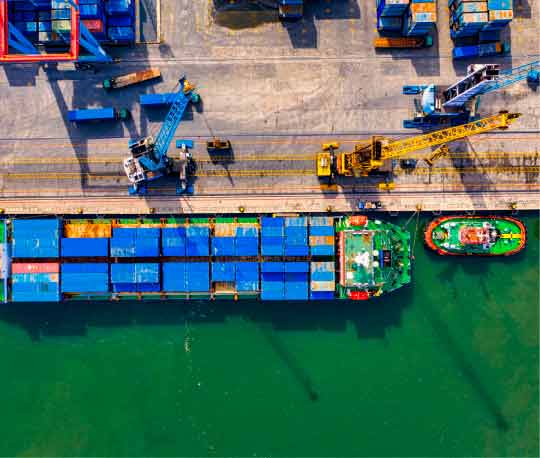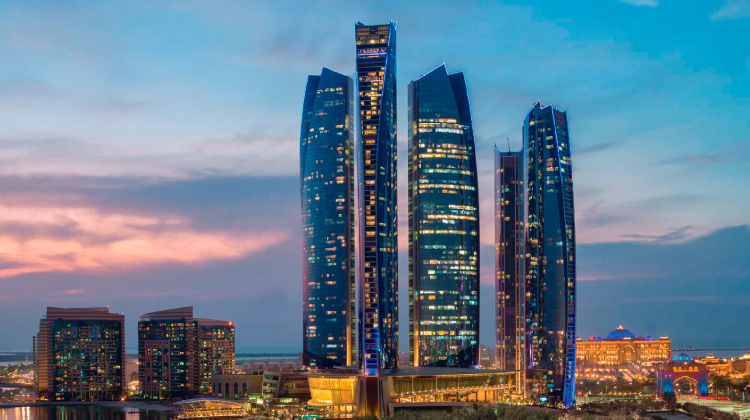Transportation and Logistics

Abu Dhabi’s status as a transport and logistics hub is well established. From roads to airports to ports, Abu Dhabi has one of the most modern and integrated infrastructures in the region
In 2020, Abu Dhabi and the UAE were ranked among the top 20 countries in 13 global transport indexes. These include:
- 2nd globally in the quality of air transportation index of IMD's World Competitiveness Yearbook 2020
- 4th in the timeliness index, 5th in the international shipments index, and 14th in the tracking and tracing index in the World Bank’s Logistics Performance Index
- 6th globally in the satisfaction with public transport index and seventh in terms of air transport infrastructure quality in The Legatum Institute’s Prosperity Index
- 12th globally in the efficiency of seaport services index in The Global Competitiveness Index 4.0
- 13th in the liner shipping connectivity index
- 14th in the Prosperity Index in the Global Competitiveness Report
- 15th in land transportation efficiency in the WEF's Travel and Tourism Competitiveness Report https://www.wam.ae/en/details
Abu Dhabi is also ranked as the world’s least congested capital according to the TomTom Traffic Index for 2021, based on the annual survey of 416 cities in 57 countries by the global navigation services company. https://www.zawya.com/en/press-release/abu-dhabi-tops-the-list-of-capitals-with-the-least-traffic-congestion-in-the-world-for-the-year-2021-bxn8og2b
Abu Dhabi’s strategic location between Asia, Europe and Africa makes it a crucial bridge to the world’s fastest-growing economies. To facilitate the trade and e-commerce market, Abu Dhabi has implemented several initiatives to develop a well-integrated, sustainable transport and logistics infrastructure that supports the Emirate’s economic, social, cultural, and environmental goals. These include Abu Dhabi’s Surface Transport Master Plan, Abu Dhabi Transportation Mobility Management Strategy, Plan Abu Dhabi 2030, plus it is a pillar of the Abu Dhabi Economic Vision 2030 (https://u.ae/en/more/uae-future/2021-2030)
Market Size
The Transport and Logistics sector is regarded as a critical enabler in the country’s economic diversification efforts. The industry contributes up to 10 percent of the total GDP and directly employs 6 percent of the total workforce in the MENA region. (https://www.moec.gov.ae/documents/20121/1121099) Factors such as the growing e-commerce industry coupled with a rise in trade-related agreements and tech-driven logistics services fuel market growth. (https://abudhabichamber.ae/-/media/Project/ADCCI/ADCCI)
Transport
Abu Dhabi is home to one of the fastest-growing airports, world-class port facilities and new rail network, setting a global standard in logistics and infrastructure.
Aviation
Abu Dhabi International Airport (AUH) is the second-largest airport in the UAE and one of the fastest-growing aviation hubs in the world (https://www.abudhabiairport.ae) Pre-pandemic, the city welcomed a record number of 11.35 million tourists in 2019 (https://tcaabudhabi.ae/en/media.centre/news) and that figure is expected to rise to over 45 million in the coming decade.
Abu Dhabi International Airport Midfield Terminal (MTB) (https://www.adac.ae/english/mtp) will be the largest in the Emirate and will cater to over 30 million passengers per year. The state-of-the-art structure is designed to serve as the primary gateway for the national carrier, Etihad Airways, and its codeshare and equity partners.
The 700,000m2 terminal building has been designed to achieve a minimum Two Pearl Rating, following the Urban Planning Council’s Estidama approach toward sustainable design (https://www.arup.com/projects) The project will make use of innovative and cutting-edge design elements, such as high-performance angled glass to reduce heat and increase air-conditioning efficiencies.
Etihad Cargo, the logistics arm of Etihad Airways, operates dedicated cargo and freight shipments all over the world. In 2021, it transported 729,200 tonnes of freight, (https://www.etihad.com/en-ae/news/etihad-airways-transformation-continues-to-deliver-results-with-41-improvement-on-precovid-performance) representing a 27 percent year-on-year increase, coupled with a rise in cargo revenues of 49 percent to USD 1.73 billion - the highest figure in the history of the airline.
Maritime Transport
Since its establishment in 2006, Abu Dhabi Ports has played a crucial role in the growth of the Emirate, contributing AED 76.4 billion of non-oil GDP (13.6 percent), and creating over 141,700 jobs in the capital. (https://www.adports.ae/about-us/overview) Abu Dhabi Ports operates 11 ports and has handled over 22.5 million tons of general and bulk cargo (https://www.moec.gov.ae/documents/20121)
Khalifa Port is Abu Dhabi’s flagship port and is the first semi-automated in the Gulf, and one of the most advanced in the world. It serves over 25 shipping lines, offering direct links to 70 international destinations, and boasts an intermodal transport network facilitating efficient transportation and logistics across sea, road, and air. (https://www.adports.ae/core-business/ports-terminals/ports/khalifa-port) The port will also be the first in the UAE to be linked to the new Etihad Rail network (https://www.etihadrail.ae), which is currently under construction. It will also serve as the main gateway for Kizad (Where to Set up your Business -Free Zones – KIZAD) which is set to become the largest industrial city in the region.
Post completion of all phases, the port will be able to handle 30-35 million tons of cargo.
Abu Dhabi is further investing in future innovations such as sustainable transport technologies and smart mobility solutions and services. New projects include a Light Rail Transit System, railroad and a commercial high-speed hyperloop system.




